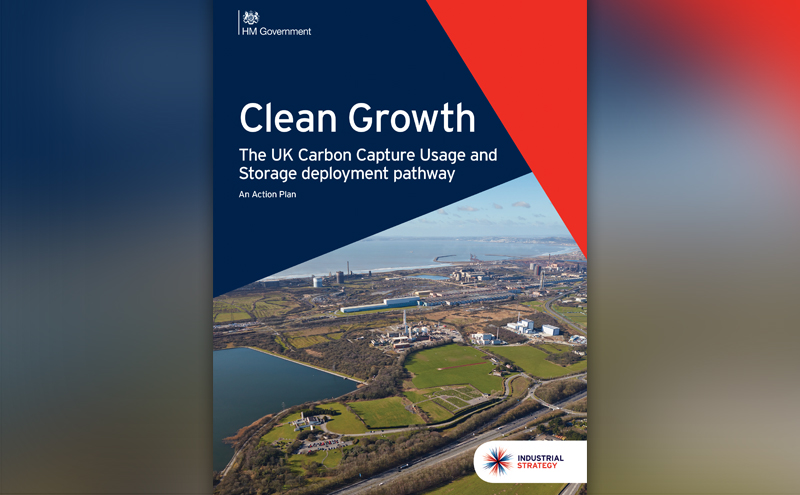本文转自《Envirotec》发布的题为“UK sizes up leading role in CCUS”的报道。
作者:Catherine Sheridan
日期:2019年1月
原文链接:https://envirotecmagazine.com/2019/01/11/uk-sizes-up-leading-role-in-ccus/?utm_campaign=meetedgar&utm_medium=social&utm_source=meetedgar.com

Plans to deploy Carbon Capture Usage and Storage (CCUS) in the UK appeared to make important strides in December.
英国部署碳捕集使用和存储(CCUS)的计划似乎在12月取得了重大进展。
At the COP24 climate talks in Poland on 13 December, the UK announced up to £170 million of new funding to support “the world’s first ‘net-zero carbon’ cluster of heavy industry by 2040.”
12月13日,在波兰举行的COP24气候谈判中,英国宣布了多达1.7亿英镑的新资金,用于支持“到2040年世界上第一个'零重碳'重工业集群”。
Energy and Clean Growth Minister Claire Perry set the “world-leading ambition” alongside plans for at least one low-carbon cluster by 2030. The UK is aiming to become a world-leader in clean technology and services that will be needed as the world tackles climate change, she said.
能源和清洁增长部长Claire Perry设定了“世界领先的雄心”,并计划到2030年至少建立一个低碳集群。英国的目标是成为世界上需要的清洁技术和服务的世界领导者。
Currently, industry accounts for around 25% of all greenhouse gas emissions in the UK, with more than two-thirds of these industrial emissions coming from energy intensive industries which are often located next to each other in clusters.
目前,工业占英国所有温室气体排放量的约25%,其中超过三分之二的工业排放来自能源密集型产业,这些产业通常彼此紧密排列。
This new funding of up to £170 million will help heavy industries like steel, ceramics, cement, chemicals, paper and glass to share expertise and innovative low-carbon solutions.
这笔高达1.7亿英镑的新资金将帮助钢铁,陶瓷,水泥,化学品,纸张和玻璃等重工业共享专业知识和创新的低碳解决方案。
Plan published
计划发布
In December the Government also published a document setting out the next steps to be taken – in tandem with industry – to fulfil its ambition of having the option to deploy CCUS at scale during the 2030s, subject to costs coming down sufficiently.
12月,政府还发布了一份文件,列出了与工业同步的下一步措施,以实现其在2030年代可以选择大规模部署CCUS的雄心,但成本可能会下降。
Professor Geoffrey Maitland of Imperial College London, a key influence on the document, said he believed “CCUS will a key part in decarbonising our modern society so we can meet the international 1.5°C target.”
伦敦帝国理工学院的Geoffrey Maitland教授表示,他相信“CCUS将成为我们现代社会脱碳的关键部分,因此我们可以达到1.5°C的国际目标。”
In comments appearing on Imperial’s website he said: “CCUS is not about continuing to use fossil fuels instead of renewables; there are many industrial processes that need the technology, like concrete production or steel-making, as well as large-scale production of hydrogen for decarbonised heating and transport, in addition to using it on power stations while we fully transition to renewable electricity.”
他在帝国网站上发表的评论中说:“CCUS不是继续使用化石燃料来替代可再生能源; 有许多工业过程需要这种技术,如混凝土生产或炼钢,以及用于脱碳加热和运输的大规模氢气生产,以及在我们完全过渡到可再生电力的同时在发电站上使用它。
Maitland suggested there was a need for, if anything, greater ambition. We “need to be encouraging businesses, possibly through tax incentives, to deploy CCUS technology quckly whilst the cost of the technology is being brought down by building multiple plants at scale rather than expecting costs to drop based on a single project.”
Maitland 表示,如果有的话,需要更大的抱负。 我们“需要鼓励企业,可能通过税收激励措施,快速部署CCUS技术,同时通过大规模建设多个工厂来降低技术成本,而不是预计基于单一项目的成本下降。”
Benedict McAleenan of the REA said the plan was “a strong step forward.” He added: “Combining Bioenergy with Carbon Capture and Storage, known as BECCS, paves the way to negative emissions, where we’ll actually remove CO2 from the atmosphere and lock it away.” The recent IPCC report had recognised the importance of BECCS, he said.
REA的Benedict McAleenan表示,该计划是“向前迈出的一大步。”他补充说:“将生物能源与碳捕集与封存相结合,称为BECCS,为负排放铺平了道路,我们实际上将从大气中去除二氧化碳, 他说:“最近的IPCC报告已经认识到了BECCS的重要性。”